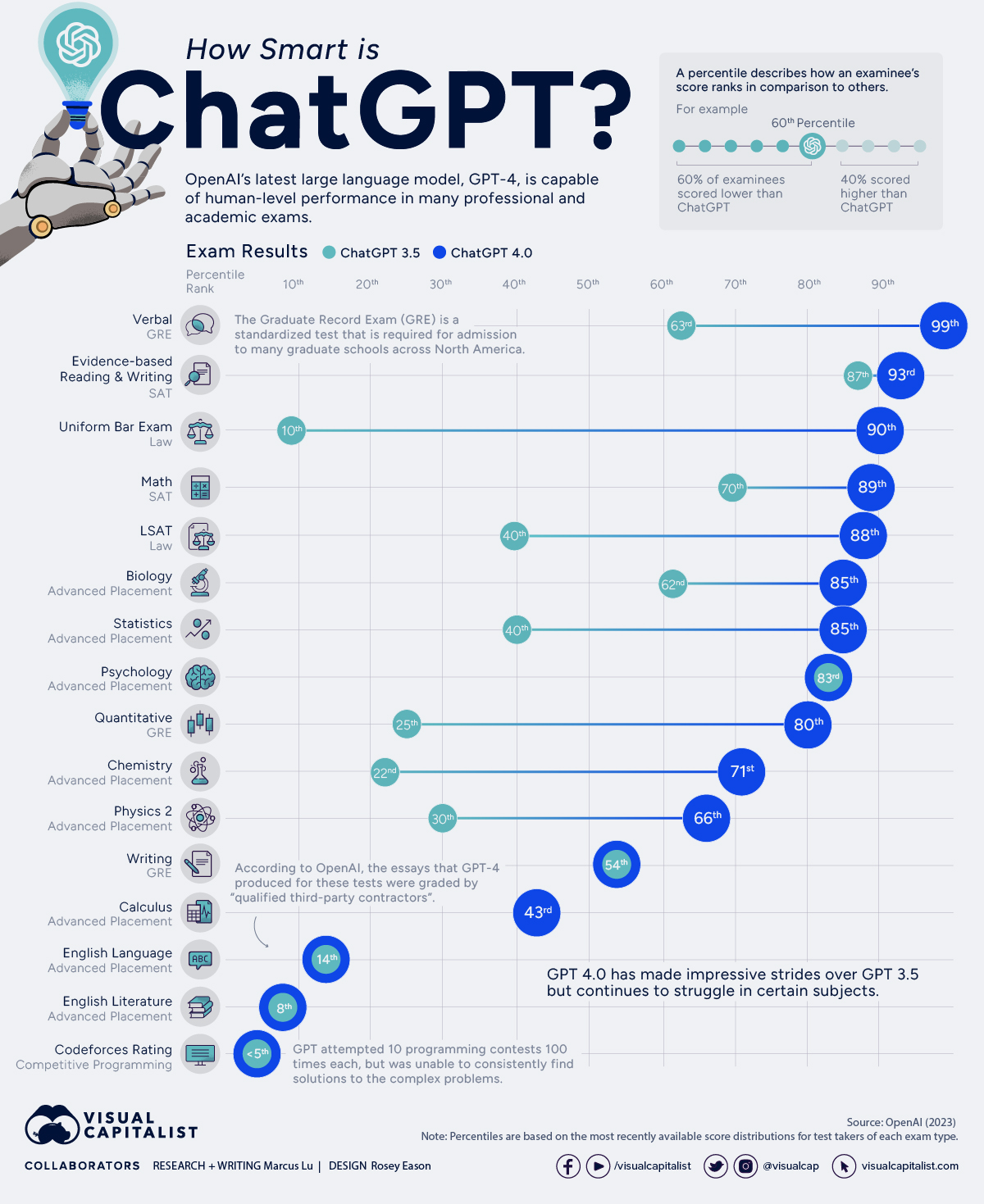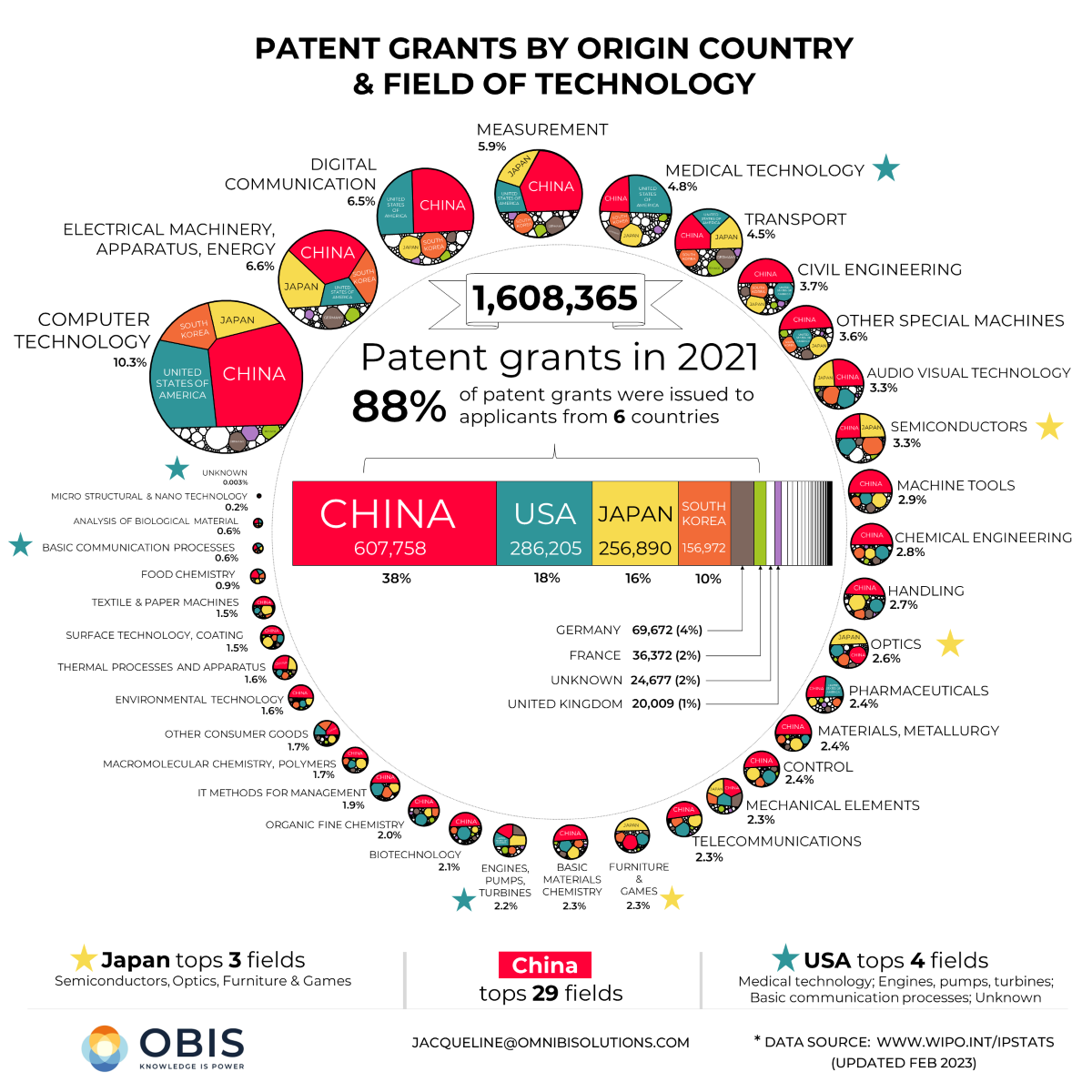It gets a little old talking about ChatGPT so often ... but it's rightfully taking the world by storm, and the innovations, improvements, and use cases keep coming.
This week, I'm keeping it simple.
VisualCapitalist put together a chart that helps contextualize how well ChatGPT tests on several popular placement tests.

via visualcapitalist
It also shows the comparison between versions 3.5 and 4.
ChatGPT 4 improvements include plugins, access to the internet, and the ability to analyze visual inputs.
Interestingly, there were a couple of places where version 4 didn't improve ... Regardless, it is already outperforming the average human in these scenarios.
Obviously, the ability to perform well on a test isn't a direct analog to intelligence - especially general intelligence. However, it's a sign that these tools can become important partners and assets in your business. Expect that it will take developing custom systems to truly transform your business, but there are a lot of easy wins you can stack by exploring what's out there already.
The takeaway is that you're missing out if you aren't experimenting.


A Lesson From My Grandmother ... On AI
I was at an event last week where (unsurprisingly) we focused heavily on AI. Conversations ranged from use cases for generative AI (and the ethics of AI image creators) to the long-term effects of AI and its adoption.
Before I could chime in, the conversation had gone to the various comparisons from past generations. When electricity was harnessed, articles claimed that it would never catch on, it would hurt productivity, and what of the artisans it would potentially put out of business if it were to gain traction.
When the radio or TV was released, the older generation was sure it would lead to the death of productivity, have horrible ramifications, and ultimately lead to the next generation's failure.
People resist change. We're wired to avoid harm more than to seek pleasure. The reason is that, evolutionarily, you have to survive to have fun.
On the other hand, my grandmother used to say: "It's easy to get used to nice things."
Here's a transcript of some of my response to the discussion:
Ultimately, as soon as you start finding ways to use emerging technologies in a way that excites you, the fear and gloom fade.
The best way to break through a wall isn't with a wide net, but rather with a sharp blow. You should be decisive and focused.
I remember being an entrepreneur in the late 90s (during the DotCom Bubble). And I remember watching people start to emulate Steve Jobs ... wearing black turtlenecks and talking about which internet company would be the "next big thing" at social gatherings. Looking back, an early sign that a crash was coming was that seemingly everybody had an opinion on what was going to be hot, and too many of them were overly confident.
The point is that almost nobody talks about the Internet that way anymore ... in part because the Internet is now part of the fabric of society. At this point, it would be weird if somebody didn't use the Internet. And you don't really even have to think about how to use the Internet anymore because there's a WHO to do almost all those HOWs.
The same is going to be true for AI. Like with any technology, it will suffer from all the same hype-cycle blues ... inflated expectations and then disillusionment. But, when we come out the other side, AI will be better for it ... just like the Internet, the silver screen, or even radio stations.
Earlier, I mentioned how long it took to get from "Zero-to-One" with AI. But we're still at like three" or a "five" on a 100-point scale. Meaning, you are at the beginning of one of the biggest and most asymptotic curves that you can imagine. And you're not late … you're early! Even the fact that you're thinking about stuff like this now means that you are massively ahead.
The trick isn't to figure out how to use AI or some AI tool. The trick is to keep the main thing the main thing.
Investing resources into your company is one thing. Realize that there are 1000s of these tools out there, and many more coming. You don't have to build something yourself. It is often faster and better to acquire a tool than it is to spend money on developing and building it.
Think of the Medici family. They invested in people, which in turn triggered the Renaissance. A key to moving forward in the Age of AI will be to invest in the right people who seek to create the kind of world you want to see. Think of this as a strategic investment into creators and entrepreneurs with a vision who are on a path that aligns with yours.
As you get better and better at doing that, you'll see increasing opportunities to use tools to engage people to collaborate with and create joint ventures. Ultimately, you will collaborate with technology where it's your thought partner and then your business partner. We are entering exciting times where AI, automation, and innovation will make extraordinary things possible for people looking for opportunities to do extraordinary things.
Posted at 03:38 PM in Business, Current Affairs, Gadgets, Ideas, Market Commentary, Personal Development, Science, Trading Tools, Web/Tech | Permalink | Comments (0)
Reblog (0)